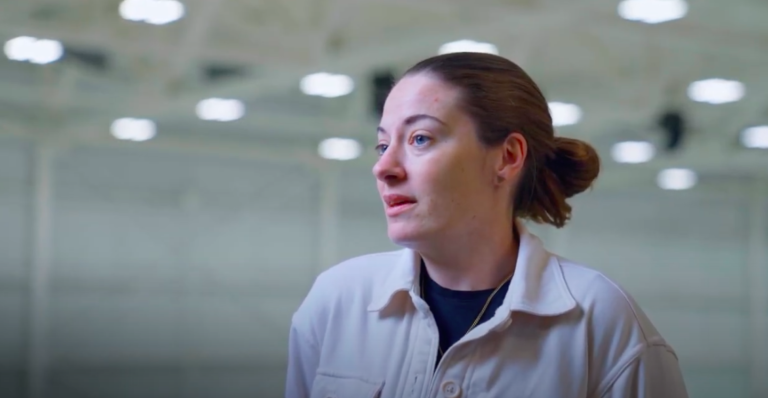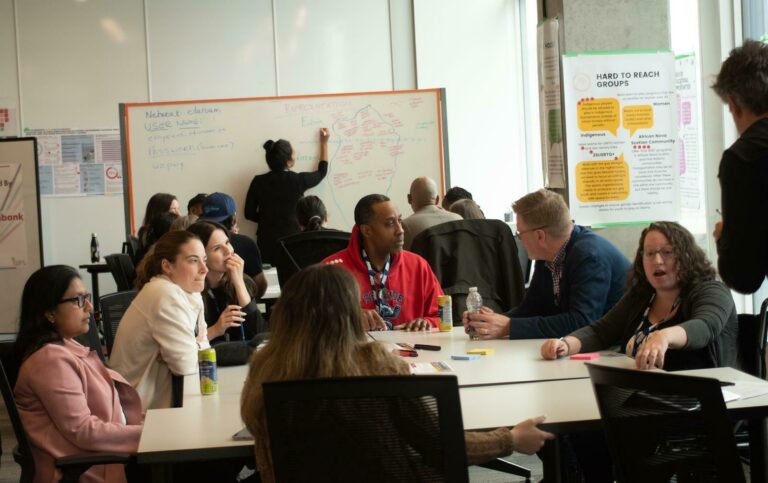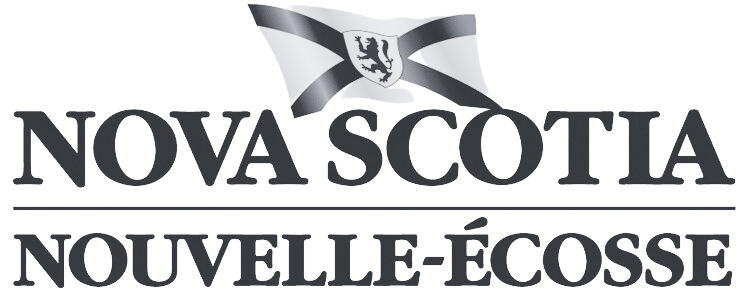Written by Denise Withers
Laura Oliver was just seven years old when she got the message loud and clear that hockey belonged to boys.
"I always saw the inequities in hockey between the boys' leagues and the girls' leagues. When I first started hockey, I noticed that my brother would get better ice times than I would. He would get the 8 and 9AMs and the girls would get the 6 and 7AMs. I also saw that boys always had websites where their stats were tracked and it was always the boys mentioned in the newspapers. So I always wanted to defy that and change it. As soon as I got access to the internet and figured out how HTML coding worked, I started to make little websites for my team. because nobody else seemed to be interested in it because we were the girls."
Laura went on to play rep hockey, eventually running her league as an adult. Yet, she only had one female head coach, so never saw a viable pathway for her to make hockey a career, despite her passion for the game.
Eventually, she took over leadership of the Grindstone Award Foundation, a charity that has raised money to help over 200 girls get into the game. And spent three years helping to build the business case for the new Professional Women's Hockey League (PWHL) through her job at Deloitte. She learned a ton about what's needed to create real equity for girls and gender-diverse people in hockey, but once that all wrapped up, she had no outlet to continue her work.
That's when she heard about the Future of Hockey Lab.

"I had some time available and saw that they were looking for people. And I thought, 'This takes it to a whole new level because this is not only just girls – but how do we change hockey culture across Canada?'"
She jumped at the chance to join the 2023 changemaker cohort and soon became part of an innovation team focused on increasing access to the game for women, girls and gender-diverse people.
The team looked at all the data the FHL had gathered and saw a lot of concerns from families about affordability. Playing hockey is expensive, with costs not just for registration and equipment but also for other things like travel, tournaments, training and apparel.
Laura also knew from her own experience at Grindstone that cost was a real barrier to getting girls and gender-diverse kids into the game. If parents had a boy and a girl, and could only afford to have one child play, they would pick the boy because there was a pathway for him to have a career.
"The data shows that, of all the kids registered in hockey in Canada in the 2022-23 season, still only 20% are girls. So we thought, 'Let's try to come up with a solution for affordability to try to increase that number.'"
Using the FHL's innovation process, they generated and tested several ideas to explore ways to reduce costs, like getting corporate sponsors for equipment or even travel buses. But they wanted to keep it simple and ended up focusing on registration – with the goal of creating a national solution because cost affects every family.
Laura and the team recognized that there are already grant programs available to help with registration. But most of these have eligibility requirements that can limit access.
"Through my work with the Grindstone Award, I heard a lot of families say that Grindstone is great because their registration was pretty much free. At the same time, I heard that there was still a stigma that the kids felt when they were on the ice, that their other teammates knew, 'Oh they had their hockey paid for them.'"
The other problem with existing programs is that they are not funded long-term.
The Be the NeXt team knew they'd need to find a way to create a more sustainable, equitable and just approach. Thanks to the diversity of experience among their members, they came up with an endowment fund – a kind of non-profit investment fund that’s created through donations. Most endowments are dedicated to a specific purpose like education or health, but not something like hockey.
"The idea was to create a fund that hockey associations could pull from to reduce the cost of registration at the organizational level, so the families never see the true cost. We know that hockey costs include ice times, refereeing, jerseys, insurance – all these different things. Right now, families just see this $1,000 cost. But imagine if we had an endowment fund that eliminated registration costs for women, girls and gender-diverse folks throughout their youth playing experience. When they registered, families would only have to pay maybe $200. That way, when they see the price, they think that they can manage it, which ultimately increases accessibility."
Laura Oliver
In hindsight, Laura recognizes that even her own family could have benefitted from this kind of support. "My grandparents frequently paid for my registration. My parents had a modest income, but with my brother and I both in competitive hockey with travel and such, it was still expensive."
To test the endowment idea, the team sent potential hockey families prototypes of registration forms that indicated that registration would be free, to assess their response. The feedback was overwhelmingly positive.
"So many, many people saying, 'Of course, if this is free, absolutely my family member would participate if hockey was free.'"
As expected, they did get some negative comments, asking "Why not do this for boys too?" While they acknowledge that this would be ideal in the long term, their mandate for this project was to focus on improving access for women, girls and gender-diverse people.
They also got questions about the viability of the concept – where would the money come from? Figuring this out would be the next stage of work if they were to take the project forward. Early ideas focus on a combination of long-term corporate sponsorship and private support from hockey lovers.
Plus there were other concerns raised about the long-term impact of growing the game for girls and gender-diverse kids. For example, if more kids start to play, people worry there won't be enough ice time for everyone. Laura knows these are all issues that are interconnected and recognizes the need for more system-change work like what the FHL is doing.
"Unfortunately, we've gone so long without looking at the system as a whole that there are now some big systemic issues in the game. It's definitely all connected. But with groups like the FHL starting to tackle these issues and passionate people who are interested in solving the problem, I think with time we'll start to get more girls into hockey."
As a change-maker, Laura has worked in social innovation labs before at Deloitte and with previous employers. But she found that the unique lab process the FHL used was especially powerful in enabling them to develop this idea.
"Every lab process is different, but I really loved how the Future of Hockey did this lab. I love that they brought us all together. I love that they came in with the data already and let us figure out the problem. Plus, they didn't try to sway any of the teams toward a certain problem or solution. It was really up to us to take all the information that we had, along with our previous experience or the data that the lab had gathered – then formulate what we thought were the root causes of these problems and come up with the solutions that we thought were best."

While she and her teammates hope their endowment fund could be a radical catalyst for change, she knows we still have a long way to go before we see real equity for women, girls and gender-diverse people in hockey.
"They deserve a chance to play too. For so many years, the light has been shone on the boys. We have the NHL and all of these feeder systems that we have continued to pump money into for the males. And we haven't done the same for females. At the root of all this is that we're still not there in the world, where women and gender-diverse people are seen as equal. Whether it's in hockey or any other sport, I think they really deserve to be seen as equal.”
“Unfortunately, we did this to the game. It's not one person, one set of people. We all did this to hockey and we've brought it to the place where it's not accessible or safe for all. And I truly believe that everyone can play a part in changing the game. We really need men to be part of the solution too. Everyone – from players, to parents, to coaches, to referees, to fans, all the way up to the government supporting the sporting organizations – has to be involved. And I think when everybody understands their role in it, we'll start to see some change."



